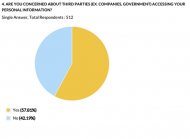 Fun fact: One in three teenagers regret posting something online by the young age of 16. According to Digital Diaries research from AVG Technologies, the online security company for 182 million active users, has found that almost one third of teens, 28%, have noted that they regret posting something online. Research has also found that 32% have asked someone to remove content posted online about them, with 61% admitting it was because they didn’t like it and 28% noting that it was too personal.
Fun fact: One in three teenagers regret posting something online by the young age of 16. According to Digital Diaries research from AVG Technologies, the online security company for 182 million active users, has found that almost one third of teens, 28%, have noted that they regret posting something online. Research has also found that 32% have asked someone to remove content posted online about them, with 61% admitting it was because they didn’t like it and 28% noting that it was too personal.
Slowly, society is realizing the extent to which the online world invades, what most believe to be simple, online privacy. Despite a third of teenagers currently regretting posting online, that number can change. Advancements in technological devices ranging from cellphones, to tablets and laptops are calling for the collection of more user data. In addition, smart device applications created for children is being collected regularly from a very young age, including their parental information. This information spans from purchases, views, listening, and watching habits, to personal postings on all social media outlets.
Privacy Settings
 According to a survey posted on Microsoft’s official blog, the issue of privacy is a time bomb for the growth of technology, both in developed and developing countries like Indonesia. Out of 512 respondents, more than 40% do care and carefully learn the privacy setting in each and every service they use, with 57.81% of respondents worried that their personal data could be used by an unauthorised third party. Nonetheless, 12% admitted that the privacy setting does not interest them.
According to a survey posted on Microsoft’s official blog, the issue of privacy is a time bomb for the growth of technology, both in developed and developing countries like Indonesia. Out of 512 respondents, more than 40% do care and carefully learn the privacy setting in each and every service they use, with 57.81% of respondents worried that their personal data could be used by an unauthorised third party. Nonetheless, 12% admitted that the privacy setting does not interest them.
On and Offline Security
Global research questioning almost 4, 000 teenagers aged 11 to 16 years on the topic of online privacy painted an overall picture of a struggle for control. Although 70% have changed their settings on Facebook to make it more difficult for people to find them, and 71% say they understand what online privacy means, only 29% say they properly “know” all of their Facebook friends. This information implies that pre-teens and older children may “friend” Facebook friends they don’t know or have never met. These “friends” could be bots who collect information of their friend lists. A more frightening reality is that online connections could be predators who prey on the lack of online privacy features applications have set as default.













